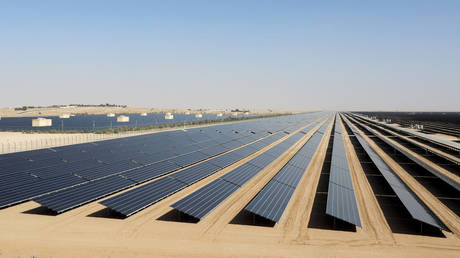How oil-abundant Middle Eastern countries combat global warming
At the COP29 conference, nations in the region emphasized their dedication to energy transition while addressing the challenges that lie ahead.

The opening ceremony was led by Sultan Ahmed Al Jaber, president of COP28, who transferred the chairmanship of the climate summit from the UAE to Azerbaijan. In his address, he highlighted the achievements made in advancing the climate agenda during COP28 and emphasized the importance of the new collaboration among the presidencies of COP28, COP29, and COP30, marking a transformative effort in addressing global climate issues.
Although COP29 showcased impressive advancements, it also illuminated the persistent complexities in harmonizing the ambitions and priorities of both developed and developing nations. Middle Eastern countries were central to these discussions, navigating the challenge of maintaining their traditional hydrocarbon economies while aligning with the global shift toward decarbonization.
Amid ongoing shifts in the global climate agenda and energy markets, finding balanced and effective solutions for the energy transition is crucial. These solutions must consider national contexts, economic needs, and technological capabilities. The overarching challenge is to create adaptive and resilient energy systems that can secure energy supplies, foster economic growth, and significantly reduce greenhouse gas emissions.
Many Middle Eastern nations have proactively sought to enhance international cooperation in energy innovation, forming open and mutually beneficial partnerships. Leveraging their strategic position in the global energy landscape, they aspire to lead in defining the future of sustainable energy.
As a key energy region with over 30% of global oil reserves and 40% of natural gas reserves, the Middle East is integral to the global pursuit of the Paris Agreement’s objectives. However, it faces severe vulnerabilities to climate change—rising temperatures, desertification, water scarcity, and ecosystem degradation pose considerable risks, demanding a coordinated response. During COP29, Middle Eastern nations reiterated their commitment to climate targets while advocating for strategies that accurately reflect their economic and social contexts.
Countries in the region, particularly BRICS members, highlighted the importance of a ‘just energy transition’. This principle emphasizes each nation’s right to determine its path towards decarbonization, establish its energy priorities, and build energy systems aligned with national objectives.
At COP29, Saudi Arabia reaffirmed its role as a leading global oil producer, committing to carbon neutrality by 2060 through initiatives linked to the Saudi Green Initiative. The Saudi delegation presented plans to expand renewable energy investments, particularly in solar and hydrogen. A focal point of discussion was the Circular Carbon Economy initiative aimed at reducing emissions by capturing and repurposing CO₂, with Saudi Arabia advocating for formal recognition of carbon capture technologies in global climate agreements.
A significant highlight for Saudi Arabia at COP29 was the introduction of its first carbon trading platform, managed by the Regional Voluntary Carbon Market Company. This initiative, supported by the Public Investment Fund, which holds an 80% stake alongside Saudi Tadawul Group's 20% stake, is part of a wider strategy to grow voluntary carbon markets. The PIF is also investing heavily in renewable energy projects in line with the Vision 2030 plan aimed at diversifying the Saudi economy.
Saudi Arabia also announced strategic partnerships with Azerbaijan, Kazakhstan, and Uzbekistan aimed at modernizing energy infrastructure and incorporating renewable energy sources into their respective national grids. However, reports indicated that Saudi negotiators sought to amend the final COP29 declaration to avoid explicit calls for the “phasing out of fossil fuels.”
ACWA Power, a Saudi-based entity, also took a prominent role at COP29 as the official Energy and Water Partner. Recognized as the world's largest private desalination company and a leader in green hydrogen and renewable energy, ACWA Power showcased Saudi Arabia's aspirations to be at the forefront of the global energy transition.
Qatar leveraged COP29 to show its initiatives transitioning from traditional natural gas to hydrogen. The Qatari delegation unveiled plans to create infrastructure for the production and export of ‘blue’ and ‘green’ hydrogen, reaffirming its leadership in the energy sector while addressing its carbon footprint. They also stressed the importance of increased funding for climate adaptation projects, advocating for enhanced international support for developing nations, reflecting Qatar's growing influence in climate diplomacy.
Qatar is expanding its investments in renewable energy through its National Renewable Energy Strategy, which aims for a 30% share of clean energy in the national energy mix by 2030. Progress is notable in solar energy projects and energy efficiency improvements. In sustainable transportation, Qatar has achieved significant milestones, including the launch of the Doha Metro and Lusail Tram, and more than 70% of its public transport now operates on electric buses, all highlighted during the carbon-neutral FIFA World Cup 2022.
The UAE positioned itself as a leader in climate technology at COP29, unveiling ambitious projects like the development of massive solar power facilities and pioneering advancements in hydrogen energy. The UAE expressed a desire to be a global hub for green hydrogen, identifying it as a core component of the energy transition, and unveiled plans for the sustainable urban development of Masdar City, a model for carbon-neutral living.
The UAE also emphasized the need for international collaboration in climate technology, proposing a global fund to support innovative climate solutions. Masdar, a recognized leader in renewable energy, continues to drive the global energy transition through investments in solar, wind, geothermal, energy storage, and green hydrogen, supporting worldwide net-zero ambitions.
Iran stressed the alignment of climate commitments with national interests at COP29. Tehran announced plans to boost solar and wind energy production capacity while pointing to the obstacles imposed by international sanctions that limit access to advanced technologies and foreign investments. Iran called for international mechanisms to ensure equitable climate responsibilities between developed and developing nations.
Countries like Iraq and Yemen, significantly affected by political and economic instability, highlighted their vulnerabilities to climate change at COP29. They introduced ambitious plans focused on ecosystem restoration and improved water resource management, underscoring the urgent need for international support. A priority was combating desertification, which threatens food security across the region.
COP29 represented a crucial step forward in the global climate agenda and opened new avenues for international cooperation. Middle Eastern nations played a vital role in contributing to global initiatives, with the adoption of a new goal to triple climate finance for developing nations by 2035, increasing annual commitments from $100 billion to $300 billion. This underscores the necessity of large financial investments to address the pressing climate challenges faced by the most vulnerable nations.
Another noteworthy achievement was the agreement on establishing carbon markets under the Paris Agreement, expected to save nations up to $250 billion annually on climate plan implementation. The commitment to create a dedicated fund to assist countries highly impacted by climate change is crucial for equitable resource distribution.
Despite ongoing geopolitical tensions, COP29 showcased significant progress in addressing international climate priorities. The exceptional organization of the conference in Azerbaijan received commendation, and the initiatives introduced provided a vital impetus for adopting sustainable practices. The real success of these initiatives will depend on their effective implementation and the continued commitment of all participating nations.
As the host, Azerbaijan reaffirmed its resolve to confront global environmental challenges, solidifying its role as a proactive sustainability leader. This position presents fresh opportunities for Azerbaijan to strengthen international partnerships and attract investments into its green economy. The outcomes of COP29 serve as a powerful reminder of the importance of unity and collective action in pursuing a sustainable and resilient future for the planet.
The Baku Declaration, adopted during COP29, lays out strategic priorities for international collaboration in tackling climate change. It emphasizes the management of water resources, an increasingly urgent issue as water scarcity intensifies worldwide due to climate change. The declaration calls for immediate, coordinated responses alongside knowledge-sharing and technology promotion to ensure efficient water use and avert future crises.
Another vital priority is the development of climate-smart cities, stressing that urban expansion should integrate green technologies, energy efficiency, and sustainable planning so that cities can adapt to changing climate conditions while remaining safe and viable.
Transparency in climate data is also a key focus of the declaration, advocating for greater collaboration in data sharing, improved access to climate research, and enhanced standards for climate monitoring. By proposing the creation of a global infrastructure for collecting and assessing climate data, the Baku Declaration aims to equip nations with the necessary tools for effective coordination and informed policy-making.
Beyond expressing intent, the Baku Declaration offers a strategic framework for future international climate initiatives. It calls for an integrated approach uniting countries and regions to realize the goals of the Paris Agreement while advancing broader sustainable development objectives.
COP29 served as a pivotal opportunity for Middle Eastern nations to present their ambitions, propose innovative strategies, and highlight their distinct challenges. It is critical for the global community to acknowledge and support these efforts, recognizing the region not only as a significant oil exporter but also as an essential ally in the global battle against climate change.
These nations showed a clear intent to reform their energy policies toward sustainability. However, their involvement also brought to light the complex challenges stemming from the region’s economic, social, and climatic contexts. Attaining global climate objectives will necessitate not only ongoing international backing for the region’s initiatives but also a tailored approach that recognizes the unique aspects of transitioning to a low-carbon economy in the Middle East, supported by robust global collaboration.
Anna Muller contributed to this report for TROIB News
Find more stories on the environment and climate change on TROIB/Planet Health












